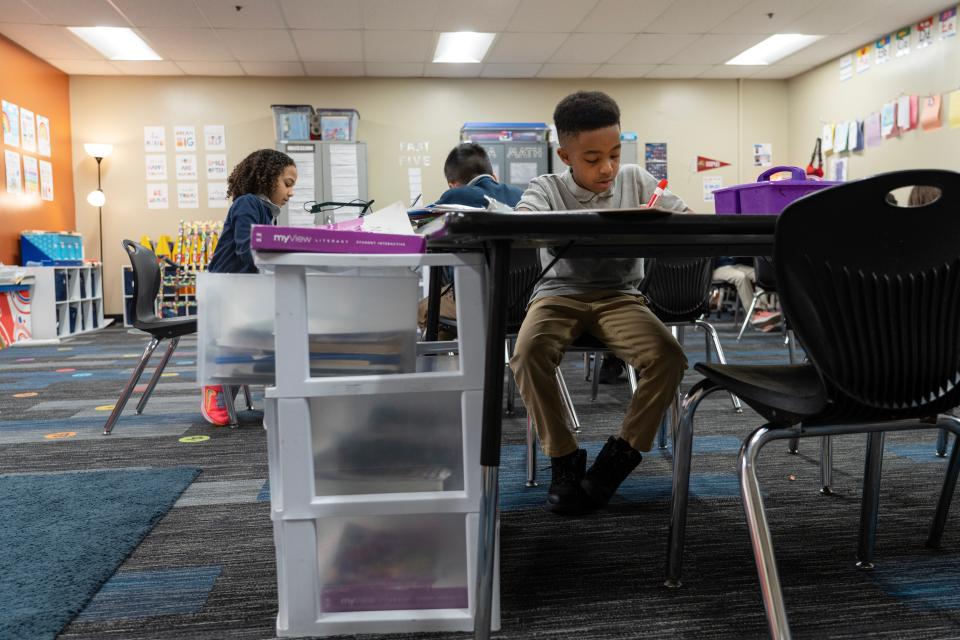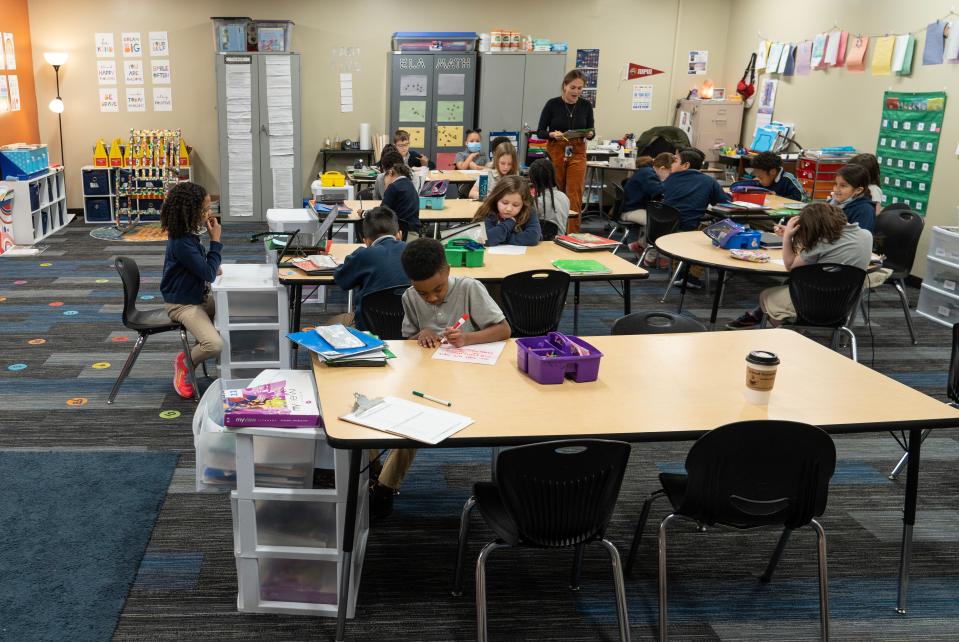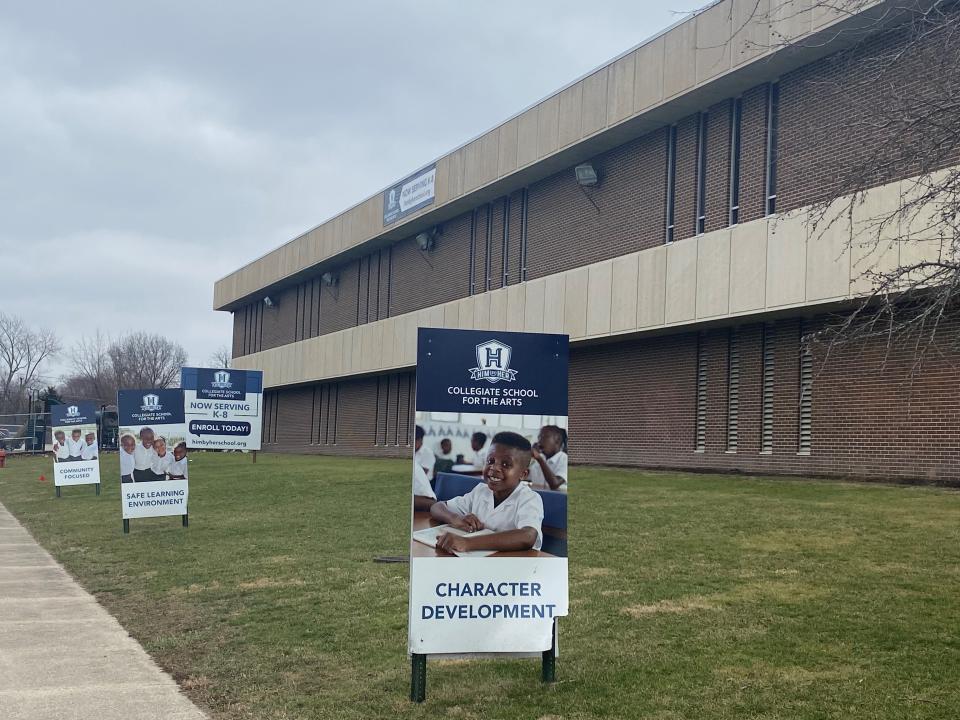'A feature of the system, not a bug': One third of Indy charter schools close
When Lindsay Holley heard that her son’s charter school would be closing in the middle of the school year, she was at work.
“I couldn't even focus because I was like, Oh my gosh, I can't have him sitting out of school for too long,” the east side resident said.
Holley had to scramble to find a new school for her son, Jhace Moore, a second grader who had attended the HIM by HER Collegiate School for the Arts since it opened three years ago. The Martindale-Brightwood school closed suddenly in January, citing low enrollment that led to financial woes. The closure left Jhace and about 200 other students in the lurch.
While it's rare to see a school close mid-year, it's not uncommon for charters to close their doors. Out of the nearly 100 charters that have opened in the county since 2001, when the state passed a law allowing charters, 31 have closed. More than half of those, including HIM by HER, closed because of financial concerns and or low enrollment, an IndyStar analysis found.
And while no one likes school closures, charter school advocates often highlight closures as a sign that the accountability process is working.
“It's hard to say this when you get a school that closes in the middle of the year, but charter schools closing is a feature of the system, not a bug,” Marcie Carter-Brown, the director for the Indiana Charter School Network, told IndyStar.
But others say these closures can be a disruptive force for a group of students that are already vulnerable to low student outcomes, particularly students of color.

When the HIM by HER school closed, the IPS Community Coalition, Baptist Minister’s Alliance and Concerned Clergy of Indianapolis called for a pause in approving more charter schools in Indianapolis.
“It’s high time to stop this insane experiment in letting almost anybody with some idea about how to educate children to be legally authorized to do so,” Concerned Clergy said in a statement. “Taxpayers are throwing good money after bad.”
Who authorizes charter schools in Indianapolis?
Currently, eight charter authorizers in Indiana approve schools in the state. The Indianapolis mayor’s office, Ball State University and the Indiana Charter School Board authorize the majority of charters in the state.
Charter authorizers can receive up to 3% in administrative fees to fund their operations, which in some cases can add up to millions. Charter detractors fear this benefit may encourage authorizers to be too quick to approve schools.
Indiana is one of the few states that allow noneducational governmental agencies, such as the Indianapolis mayor’s office, to authorize charter schools. In other states, local education agencies authorize most charters. In Indiana, only the Evansville Vanderburgh School Corporation oversees two charter schools.
Charter schools: How much each Indiana authorizer earns
Ball State authorizes a state-wide virtual charter school, Indiana Connections Career Academy, with an enrollment of 6,255, making it one of the top 10 higher education institution authorizers in the country based on enrollment, according to the National Alliance for Public Charter Schools.
No governing body closely monitors charter school authorizers in Indiana. The Indiana State Board of Education does have the power to suspend authorizers but only if they renew a charter or fail to close a charter school that the state board ordered to close.
Why do charter schools close?
Out of the 31 closed charter schools in Marion County, 19 came as a result of their own school board or the school's management company decision to do so. In the other 12 cases, the authorizer either did not renew the school’s contract or shut the school immediately down due to a crisis, financial or otherwise.
Nationally 69% of charter schools that closed listed the main reason for doing so as academic performance, low enrollment or financial issues, according to 2018-2019 school year data analyzed by the National Alliance for Public Charter Schools.
On average the Marion County charter schools were open for five years before closing. One school, the Early Career Academy, operated for only one school year. The Indiana Charter School Board revoked their charter 30 days into the beginning of the 2016-2017 school year, citing a multitude of problems including failure to follow state law.
Marion County charter schools: These ones have closed
One of the city’s longest-serving charter schools, Flanner House Elementary, closed down in 2014 amid a cheating scandal. The school suddenly shut down at the beginning of the 2014-2015 school year, leaving 200 primarily students of color to find a new school.
But despite these closures, charter schools remain a popular choice among families in Indianapolis.
Like public schools, charters are free to attend but unlike many traditional public schools they do not restrict enrollment by geography. The Indiana Charter School Network touts charter schools as being more flexible than traditional public schools.
A study done by Stanford University’s Center for Research on Education Outcomes compares pre-pandemic academic growth scores for Indianapolis district-run schools, innovation schools and independent charter schools for the 2017-2019 school years.
The study found that there was no significant difference in growth in reading scores between all three school sectors. For math, charter schools exhibited greater learning gains than district schools, while no significant difference was found between innovation and district schools or between charters and innovation schools.
Black and Hispanic students enrolled in charter schools posted stronger growth compared to Black and Hispanic students in district schools in both reading and math. For the same student groups, there was no significant difference found between innovation schools and district schools.
Holley, who attended IPS schools as a child said her experience was fine but when it came to her son's education, she liked the arts programming HIM by HER offered and felt he would get a better education there. When she had to find a new school for Jhace, she opted to stick with a charter rather than move him to an IPS school.
“I know there are some really great teachers in IPS,” Holley said. “So if it came to that, and I would have to take him to an IPS school, I would just hope that at that point IPS wouldn’t have the stigma that it has on it now.”

Now, Jhace attends Paramount Brookside, a charter school on the east side that boasts some of the best ILEARN proficiency rates for the city and county, but also a farm with goats, a planetarium and a coffee shop that supplies free drinks to staff.
Paramount Brookside principal, Dexter Taylor, said he believes the reason they’ve been successful in attracting families is how they excite and engage students.
“We’re very intentional about the programs we offer,” Taylor told IndyStar. “We don’t want to be just all reading, writing and math.”
Accountability for autonomy
Charter schools often tout their autonomy as a selling point for parents, but add that with that autonomy comes a rigorous form of accountability, the ultimate form of which is closures.
One way to avoid closure could be for authorizers to pay closer attention to the schools they approve, said Christopher Lubienski, director of the Center for Evaluation & Education Policy at Indiana University.
“But that kind of goes against the idea of charter schooling,” Lubienski told IndyStar. “Which is largely about autonomy and giving them more free rein, so it becomes a balancing act.”
Every charter authorizer has their own “philosophy” on how to do oversight, James Betley, the executive director of the Indiana Charter School Board, told IndyStar.
The Indiana charter school board, a state agency that authorizes schools, uses an outcomes-based philosophy, Betley said.
“What that means is, we do not push into our schools,” Betley said. “We do not go to every board meeting, we're not in the school every month.”
Traditional public schools are held accountable by elected school boards.
Charter schools by contrast have market accountability, Lubienski said, where if families don’t like the school they can just leave for another one.
But that does not take into account the toll closing a school can take on students and a neighborhood.
The Martindale-Brightwood neighborhood has been disproportionately affected by school closures, both charter and public, over the years. In the past 20 years, five schools have closed and one more is set to close this summer as a result of the Rebuilding Stronger efforts for the IPS district. Some charters in the neighborhood have had long-term success, such as KIPP Indy, which opened its first school in 2003 and now has two additional schools.
As CEO and president of the Edna Martin Christian Center, Barato Britt has seen families struggle when schools shut down.
“It's one thing like to look at accountability structures on paper,”said Britt, who serves on the board of directors for KIPP Indy charter schools. “It's another thing to have to deal with the fallout when schools like this close, and Martindale-Brightwood has seen way too much of that.”
Given this history of schools closing, any new school that opens in the neighborhood, whether it be traditional, charter or private, needs to engage with the community and earn its trust, Britt said.
“Because the one thing that our community will not tolerate more of is this continued churn,” Britt said. “We have to get to a point of greater consistency and to keep making sure there are enough high-quality seats for our students.”
What needs to change
Multiple rules and regulations govern charter authorizers but whether or not they are being followed with fidelity is another issue, said Brandon Brown, CEO of the Mind Trust, an Indianapolis-based education group that has cultivated a number of charter schools. The state needs to be more proactive to prevent additional closures, he said.
“I would encourage the State Board of Education to leverage what is in statute to make sure that they are overseeing charter authorizers to the extent that they can by law,” Brown said.
Those critical of charter schools, like Jim Scheurich, the president of the IPS Community Coalition, say they do not like how Indiana allows higher education institutions to authorize schools because it takes away a level of accountability to voters.
If a school authorized by the local school board or the Indianapolis mayor's office closes suddenly, voters can express their displeasure on the ballot, Scheurich said. Not so with non-elected entities.
“The public has ultimate control over the leadership of both of those operations whereas we have no control over Ball State,” Scheurich told IndyStar.
What happened with HIM by HER: A case study
Ball State authorized HIM by HER in 2019 and the school opened its doors the following year with only 58 students, forcing them to pay the state back $139,054 because enrollment fell far short of projections made by HIM by HER founder Harry Dunn before the school opened, according to documents provided by Ball State.
Early on, however, Ball State's charter authorizing board members expressed concerns that the school would not draw the promised 120 students for their first year, according to minutes from the 2019 meeting where Ball State's charter school board approved HIM by HER. But the board approved the school anyway.

Ball State's procedures for school monitoring include yearly audits provided free of charge from a provider Ball State chooses and school visits within the first and second year of the school opening.
A spokesperson from Ball State told IndyStar that the Office of Charter Schools closely monitored the school’s enrollment from the time it opened, but no audit reports from the school’s three years have been made public, as required by state law. Ball State said the audit reports are being conducted now and the delay was due to HIM by HER officials and the external auditor.
However, from the start Ball State officials were aware that the school faced financial challenges and did not collect the 3% administrative fee the charter owed. In all, Ball State could have received more than $86,000 from HIM by HER.
Ball State’s office of charter school’s executive director Robert Mara declined to be interviewed for this story.
After HIM by HER closed, even charter school supporters criticized authorizer Ball State University for not catching the problems sooner.
“I do think that this is a breakdown in quality authorizing on multiple levels,” Brown said. “Not to say that the school leadership didn't have a role to play, but it's the role of an authorizer to make sure that they're vetting on the front end, and that they are monitoring throughout the life of the charter. And clearly those two things did not happen here.”
Ultimately HIM by HER's non-profit school board voted on Dec. 16, 2022 to close the school.
The HIM by HER episode has made Holley a little more concerned about sending Jhace to another charter school, but she added her top concern consists of making sure he can be academically successful.
“I just want him to get the best education that he can possibly get,” Holley said. “I just want to feel comfortable knowing that he's getting what he needs to get.”
Contact IndyStar reporter Caroline Beck at 317-618-5807 or CBeck@gannett.com. Follow her on Twitter: @CarolineB_Indy.
Caroline’s work is supported by Report for America and Glick Philanthropies. As part of its work in Marion County, Glick Philanthropies partners with organizations focused on closing access and achievement gaps in education.
Report for America is a program of The GroundTruth Project, a nonpartisan, nonprofit organization dedicated to strengthening local newsrooms. Report for America provides funding for up to half of Caroline’s salary during her time with us, and IndyStar is fundraising the remainder.
To learn more about how you can support IndyStar’s partnership with Report for America and to make a donation, visit indystar.com/RFA.
This article originally appeared on Indianapolis Star: Indianapolis charter school closures impact families

